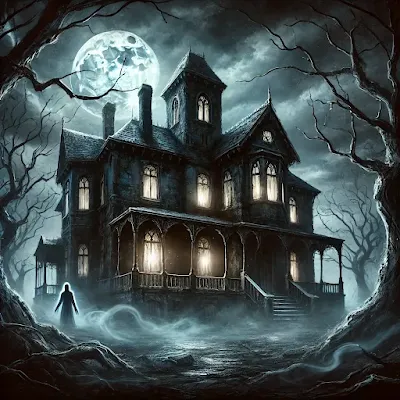*Mystical and Supernatural Aspects of Night
1. Cultural Myths and Folklore: In many cultures, the night is a time when supernatural forces are believed to be at their strongest. Ancient myths from all over the world feature creatures and spirits that come out at night. For example:
In Western folklore, night is associated with creatures like vampires, werewolves, and ghosts.
In Hindu mythology, Ratri, the goddess of night, embodies both its soothing and terrifying aspects, protecting against evil forces.
Many cultures also believe in the presence of nocturnal spirits or fairies who are active only during the dark hours.
2. The Moon and Stars: The moon has long been a symbol of mystery and magic, especially when it comes to rituals and omens. People in ancient times believed the moon’s phases could influence human behavior (e.g., the word "lunatic" originates from the Latin word for moon, "luna"). The starry sky was also a source of deep fascination. Ancient civilizations believed the stars were the gods watching over the Earth or that they held secrets of the universe.
3. Witchcraft and Magic: The night has historically been linked with witchcraft and magic. Certain times of the night, like midnight (the "witching hour"), were believed to be especially potent for performing spells, summoning spirits, or engaging in rituals.
*Historical Significance of Night
1. Astronomy & Navigation: Historically, the night sky was crucial for navigation and timekeeping. Mariners used the stars, especially the North Star (Polaris), to guide their journeys across seas. Similarly, many ancient civilizations created calendars and measured time based on the movement of the moon and constellations.
2. The Night in Ancient Cultures:
Egyptians: For ancient Egyptians, the night was seen as a time when the sun god Ra traveled through the underworld. They believed Ra fought with dark forces to ensure that the sun would rise again in the morning.
Greeks and Romans: The Greeks personified the night as Nyx, a primordial deity who represented the dark, mysterious aspects of the universe. In Roman culture, Nox, the goddess of night, held a similar position. Night was seen as a transitional time, a realm where the boundaries between worlds blurred.
3. Nocturnal Activities in History:
In ancient times, most people feared the night due to the dangers posed by the dark—whether from animals or enemies. The absence of streetlights and other modern technology made nightfall a time of vulnerability.
Before the invention of artificial lighting, daily life was divided into periods of light and dark. Early human settlements relied on moonlight, torches, or candles for nighttime activities.
In medieval Europe, cities established curfews, signaling when people had to stay indoors for their safety.
*Symbolism and Psychological Aspects of Night
1. Night as a Symbol of Death and Rebirth: Night often symbolizes death or the unknown in literature and religion. However, it also symbolizes rest, renewal, and the promise of a new day. In many spiritual traditions, the night is a time for meditation, reflection, and encountering deeper truths.
2. Night & the Human Mind: Nighttime is associated with dreams and subconscious thoughts. During the night, the conscious mind takes a backseat, and the unconscious mind comes alive through dreams, often revealing hidden fears, desires, and insights.
Nightmares: Historically, people believed nightmares were caused by demons or malevolent forces. The term "incubus" referred to a demon that attacked people in their sleep, causing terrifying dreams.
Dream Interpretation: Throughout history, from ancient civilizations like the Egyptians and Greeks to modern psychology, dreams have been studied as symbols of one's mental or spiritual state.
*The Romanticism of Night
Night has often been romanticized in literature, poetry, and art:
Poetry and Literature: Romantic poets like Lord Byron and Percy Bysshe Shelley praised the beauty and tranquility of the night. The darkness allowed for reflection, imagination, and the embrace of emotions that daytime often suppressed.
Art and Music: Painters such as Vincent van Gogh captured the beauty and mystery of the night, like in his famous painting, The Starry Night. Composers like Frédéric Chopin created nocturnes, musical pieces that evoke the calm, introspective nature of the night.
*Scientific Understanding of Night
1. Astronomical Phenomena: Night happens when the Earth rotates away from the sun, causing one side of the planet to experience darkness. This daily cycle shapes biological rhythms (such as the circadian rhythm) in both humans and animals.
2. Light Pollution and the Loss of Night: With the advent of artificial lighting, the natural night has increasingly been encroached upon by light pollution. In many urban areas, it's impossible to see the stars due to the constant glow of streetlights and buildings.
3. Psychological Effects of Night: Studies have shown that darkness and nighttime can have profound effects on the human psyche. Darkness can induce feelings of calmness or anxiety, depending on the context. People with a fear of the dark (nyctophobia) may experience heightened anxiety at night.
*Modern Nightlife and Its Evolution
With the invention of electricity and modern lighting, night transformed from a time of rest and fear into a time for socialization and activity. Nightlife culture emerged in cities worldwide, including nightlife entertainment, clubs, restaurants, and activities that extend well into the night hours.
In summary, night is a deeply complex concept, a source of mystery, inspiration, fear, and beauty throughout history. Its influence extends into human culture, spirituality, and science, symbolizing both the unknown and the promise of a new beginning.





Comments
Post a Comment